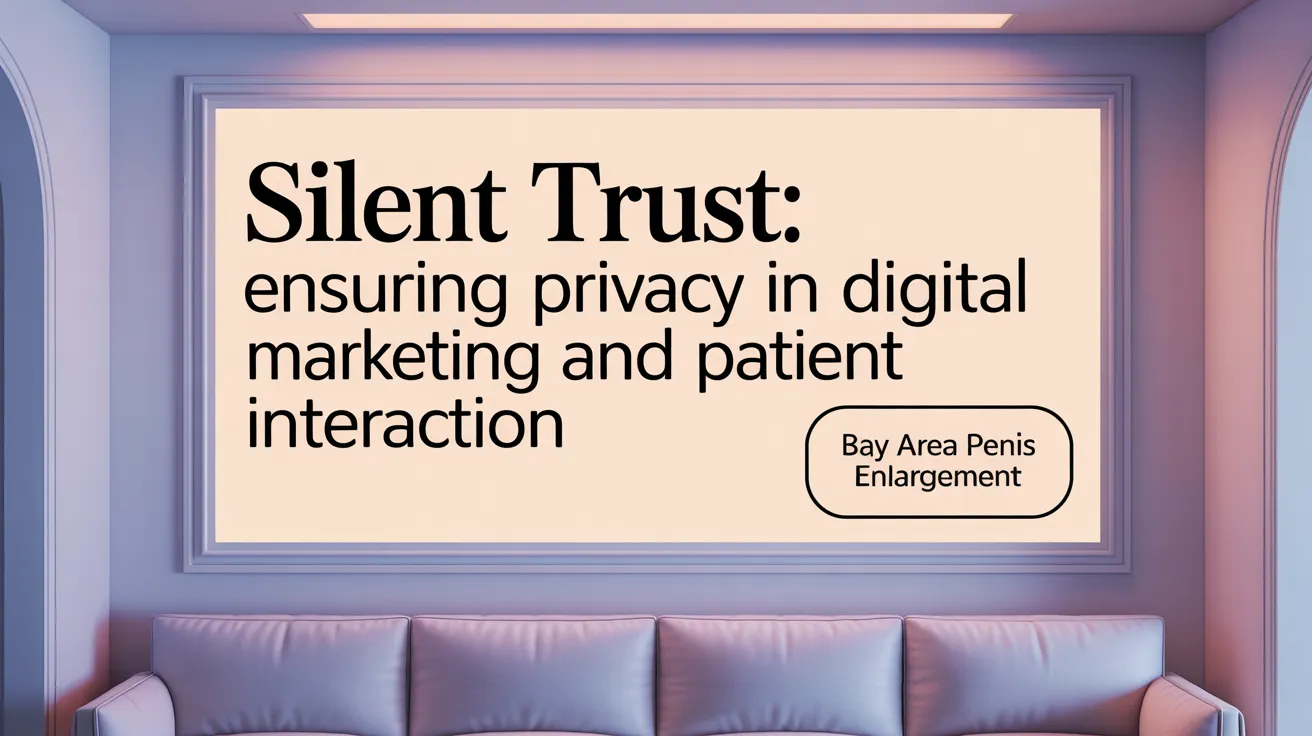The Importance of Privacy in Sensitive Healthcare
Male enhancement clinics address deeply personal concerns related to sexual health and confidence, necessitating a strong commitment to privacy and discretion. As treatments range from surgical procedures to sophisticated nonsurgical therapies, maintaining patient confidentiality is crucial for fostering trust and encouraging individuals to seek help without fear of stigma or exposure. This article explores how male enhancement clinics manage sensitive information, protect patient identity, and balance effective care with ethical privacy standards in a burgeoning healthcare niche.
Robust Privacy Policies as the Foundation of Confidential Care

How do male enhancement clinics collect and manage patient information?
Male enhancement clinics gather patient data through multiple channels including appointment registrations, during treatment visits, websites, emails, SMS, social media platforms, and from associated healthcare providers or hospitals. The types of personal information collected encompass medical history, current medications, allergies, social and family history, healthcare identifiers, and details about health insurance or funds.
Patients must provide consent for their information to be used in delivering healthcare services. Any use beyond direct care requires additional permissions, ensuring patients maintain control over their personal data. Clinics strictly follow privacy frameworks such as the Australian Privacy Principles, GDPR, PIPEDA, and HIPAA compliance to uphold patient privacy and trust.
What legal and security measures protect patient data in these clinics?
These clinics implement rigorous security protocols to protect patient data both in physical and digital formats. Access to personal information is limited only to those staff members essential for patient care or fulfillment of legal obligations.
Online communications are secured using encryption technologies, as reflected by the use of HTTPS protocols on clinic websites. Privacy policies undergo regular review and updating to ensure compliance with evolving legal and regulatory requirements across multiple jurisdictions.
Patients also have the right to access their data and request corrections, with clinics typically responding within a 30-day timeframe. These combined privacy and security measures form a foundational element, supporting confidential and trustworthy care in male enhancement services as detailed in the Privacy Policy and Data Collection Practices of specialized clinics.
Patient Confidentiality: Safeguarding Identity and Medical Information

How do clinics maintain patient confidentiality beyond legal compliance?
Clinics implement comprehensive confidentiality practices that extend well beyond basic legal requirements to protect patient identity and medical information, as detailed in the clinic's privacy policy.
Access to patient data is strictly limited to healthcare providers directly involved in the patient’s care, as well as necessary accreditation organizations, as described in Privacy Policy. This restriction minimizes risks of unauthorized information exposure.
When personal details must be shared with third parties, it is done under tightly controlled conditions and only in accordance with legal obligations, following compliance with privacy standards. This ensures that sensitive information is handled responsibly and only disclosed when absolutely necessary.
Patients hold rights to access their medical records and request corrections, with most clinics responding to such requests within 30 days, as explained in patient access to records. This transparency empowers patients to oversee and control their personal health data.
Additionally, to protect anonymity, clinics emphasize discretion in patient communication, scheduling, and treatment procedures, often tailoring interactions to ensure that privacy is preserved at every step, supporting confidential and discreet care.
Together, these measures foster a trustworthy and secure environment where patients can confidently seek care without concerns about confidentiality breaches.
Discretion in Marketing and Patient Engagement

What measures do male enhancement clinics take to ensure online privacy?
Male enhancement clinics implement comprehensive privacy policies on their websites to safeguard user data. These policies outline how personal information is collected, stored, and used, emphasizing confidentiality in healthcare interactions. For instance, they disclose the use of log files and cookies, which track website activity but clarify limitations around third-party advertising cookies to reduce unsolicited data sharing.
How is user data protected on clinic websites?
Websites typically utilize secure transmission protocols, such as HTTPS, ensuring that data exchanged between users and the clinic remains encrypted and protected from interception. They also restrict access to personal health information to authorized personnel only and comply with strict privacy regulations like GDPR, HIPAA, and Australian Privacy Principles. Furthermore, they explicitly avoid gathering information from minors, adding an additional layer of ethical data handling, consistent with the clinic's privacy policy.
What informed consent practices support patient privacy?
Clinics seek explicit consent before collecting or using personal information, especially sensitive medical data. Patient consent covers both healthcare provision and, where applicable, other uses such as marketing or research. This practice promotes transparency and empowers patients to make informed decisions about their data as detailed in Enhanced Men's Clinic Privacy Policy.
How do clinics manage advertising and third-party tracking?
While some websites integrate third-party advertising services that employ cookies and web beacons, clinics maintain limited control over these technologies. They clearly communicate this to users in their privacy statements, enabling users to exercise discretion when interacting with ads or external trackers, as explained in the Dallas Men's Health Privacy Policy.
Overall, through transparent policies, securing data transmissions, obtaining informed consent, and responsibly handling third-party tracking, male enhancement clinics foster discretion and trust in patient engagement online.
The Role of Privacy in Patient Confidence and Outcome Satisfaction

How does privacy influence patient decisions and treatment outcomes?
Privacy plays a crucial role in encouraging men to seek male enhancement treatments, which often involve sensitive psychological concerns such as low self-esteem and small penis syndrome. When clinics strictly protect patient confidentiality, men feel safer sharing personal information, which helps healthcare providers develop personalized and realistic treatment plans.
Trust-building through discretion is essential. Clinics that emphasize confidentiality and privacy reduce stigma and embarrassment, fostering a supportive environment. This openness leads to more honest communication, allowing providers to address psychological factors alongside physical treatments effectively.
Many advanced male enhancement clinics combine privacy policies with personalized care. They collect necessary personal and medical information securely, comply with regulations like HIPAA and GDPR, and ensure that only authorized personnel access patient data. These services promote comfort and confidence, which enhances engagement and treatment adherence.
Balancing privacy with comprehensive treatment means respecting patient data while integrating therapies for sexual wellness, such as shockwave therapy or hormone optimization. This approach supports both physical and mental well-being.
In summary, a strong commitment to privacy not only encourages men to seek help but also improves their treatment experience and satisfaction through trust, discretion, and individualized care.
Protecting Patients from Unsafe Products Through Ethical Disclosure

Risks Associated with Unregulated Supplements and Counterfeit Products
Many sexual enhancement supplements on the market are unregulated and may contain undeclared pharmaceutical ingredients such as sildenafil and tadalafil. These hidden substances can lead to serious health issues including dangerous drops in blood pressure, cardiovascular events, and drug interactions, especially when combined with certain prescription medications. For more detailed information on these risks, see dangers of sexual enhancement supplements, Hidden Viagra ingredients, and Over-the-counter sexual enhancement products risks.
Educating Patients About Safe Sexual Health Options
Male enhancement clinics play a crucial role in educating patients about safe and effective treatment options. By providing clear information on the dangers of counterfeit and adulterated products, clinics help patients avoid risky supplements. They encourage consultation with healthcare professionals to ensure that any enhancement method chosen is evidence-based and suited to the individual's health status. Learn more about Male Enhancement Clinic North Carolina and men's sexual health supplements safety.
Clinic Responsibility to Warn About Dangers
Healthcare providers have an ethical duty to warn patients against using unauthorized or unsafe sexual enhancement products. By discussing the potential side effects and complications of various treatments, including supplements, surgery, and injections, clinics promote informed choices that prioritize patient safety. Resources such as Unauthorized sexual enhancement products warning and FDA warning on CONTROL All Natural Sexual Enhancement provide valuable insights.
Maintaining Privacy While Providing Informed Consent
Confidentiality is fundamental in male enhancement care. Clinics ensure that personal health information, including sexual history and use of supplements, is protected under privacy laws and frameworks like HIPAA and GDPR. This privacy enables open dialogue during consultations, allowing patients to disclose sensitive details necessary to tailor safe treatment plans. See further details in the Enhanced Men's Clinic Privacy Policy and Dallas Men's Health Privacy Policy.
Integration of Medical Expertise and Privacy
Clinics integrate medical expertise with robust privacy protections by offering discreet, patient-centered consultations. Thorough discussions about risks, benefits, and alternatives occur in confidential settings, supporting trustful relationships. This careful balance safeguards patient autonomy and upholds ethical standards. For examples of treatment options and privacy integration, refer to Penis Enhancement Procedures and Male Enhancement Clinic North Carolina.
How Do Male Enhancement Clinics Use Privacy Frameworks to Educate Patients Safely About Treatments?
Clinics confidentially educate patients on the dangers posed by unregulated supplements containing hidden drugs, facilitating informed decisions free from stigma. Privacy ensures patients can openly discuss their sexual health and supplement usage, enabling safe, evidence-based treatment tailored to individual needs. Additional information on sexual enhancement supplements ingredients and Male enhancement and health care may be helpful.
Technological Advances Supporting Confidentiality in Treatment Delivery
What innovations in male enhancement treatments support patient privacy and discretion?
Modern male enhancement has seen a shift towards minimally invasive penis enlargement procedures that prioritize both effectiveness and patient confidentiality. Treatments like Hyaluronic Acid Dermal Fillers and Platelet-Rich Plasma (P-Shot) male enhancement are performed using precise injection techniques, requiring minimal downtime and leaving no visible scars. These approaches enable patients to quickly return to their everyday life, reducing the risk of exposure that traditional surgery might entail.
Regenerative medicine in urology methods are typically delivered in outpatient clinics characterized by controlled access and confidentiality protocols. This setting helps maintain discretion, as patients avoid hospital stays or lengthy recovery periods that may raise privacy concerns.
Alongside treatment innovation, strict compliance with privacy regulations such as HIPAA, GDPR, and PIPEDA ensures that sensitive health data, including medical history and treatment details, is securely handled. Clinics employ secure data transmission technologies and restrict information access to authorized personnel only, safeguarding patient identity and medical records.
These technological and procedural advances collectively offer men seeking enhancement solutions a private, efficient, and medically responsible experience, reducing anxiety related to treatment visibility and information security.
The Future of Privacy and Discretion in Male Enhancement Care
Privacy and discretion remain cornerstones of quality care in male enhancement clinics. As treatment methods evolve toward less invasive, more personalized approaches, the ability of clinics to safeguard sensitive patient information concurrently strengthens patient confidence and improves outcomes. Transparent privacy policies, secure data management, and ethical patient education equip patients to navigate enhancement options safely and discreetly. Ultimately, this careful balance between advancing sexual health treatments and robust privacy protections ensures that men seeking enhancement services can do so with dignity, security, and trust in their providers.

